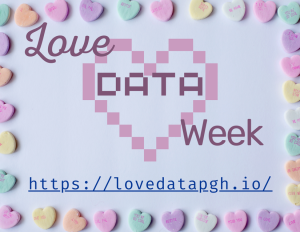The HSLS Data Services team can help you manage, publish, and share your data for any type of research project. We offer consultations, classes, and customized trainings in the following areas:
Research data management and sharing
Organizing files, writing documentation, and sharing datasets for reuse are crucial practices for improving the reproducibility of research. We offer personal consultations on data management topics and teach classes throughout the semester. In particular, we offer:
- Synchronous classes on file-naming best practices, writing data management plans for grant applications, and responsibly reusing data (or making your data available for reuse).
- Asynchronous self-paced learning modules (including one named “Sharing Data and Code”). Upon completion, you can earn badges to share on social media, LinkedIn, etc.
- One-on-one consultations on writing and implementing a data management and sharing plan (DMSP) for the NIH’s Data Management and Sharing Policy or Pitt’s Research Data Management Interim Policy.
- Review of DMSPs prior to submission with grant proposals. If you write your plan using one of the templates at DMPTool, use the “request feedback” tab to get comments and suggestions (please allow us at least five business days for an initial review of your plan).
